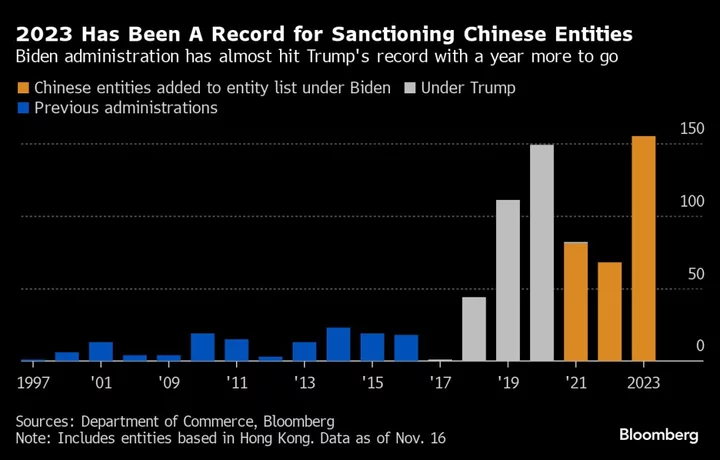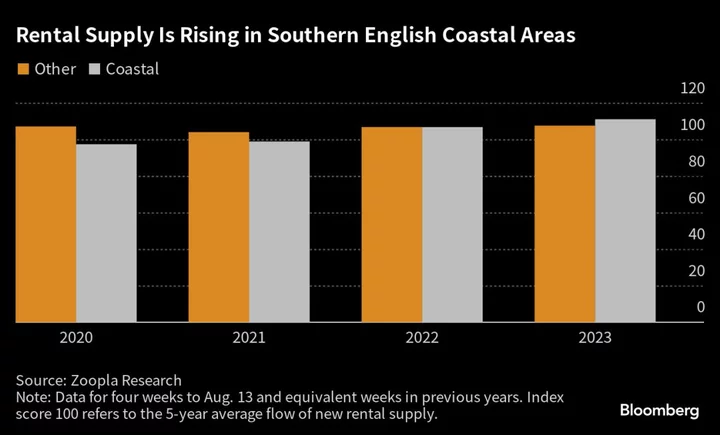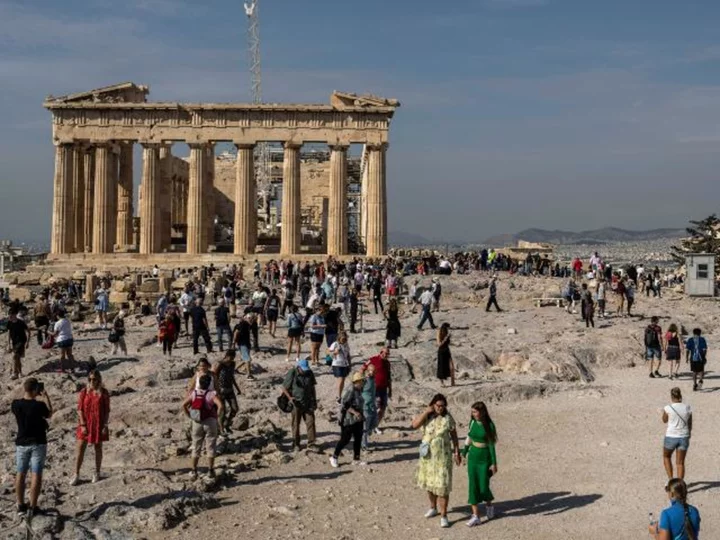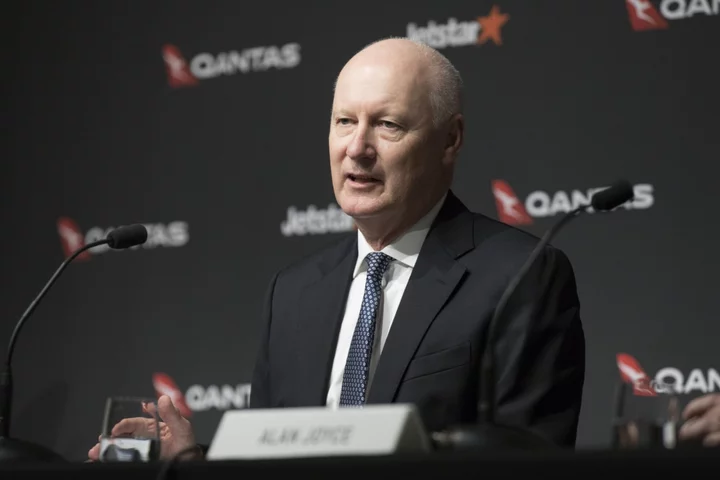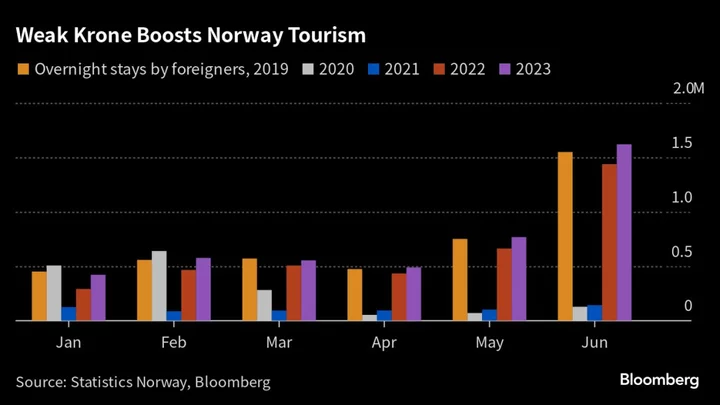US President Joe Biden and Chinese leader Xi Jinping struck a series of agreements during high-stakes talks held to stabilize a turbulent relationship strained by economic competition and military and diplomatic missteps.
The heads of the world’s two largest economies met for over four hours on Wednesday on the sidelines of the Asia-Pacific Economic Cooperation forum in California.
Both men had reason to push the relationship forward. Xi is battling economic malaise at home, with foreign investors troubled by fraught ties with the world’s largest economy. Biden is trying to steady the global environment ahead of an election that will demand his attention at home.
It wasn’t all consensus. China told the US that its territorial ambitions toward Taiwan are “unstoppable” and ordered Washington to stop arming the self-ruled island Beijing claims as its own. US officials pressed Chinese counterparts to discuss the conflict between Israel and Hamas with Iran, and underscored the importance of upholding human rights.
Here are the biggest agreements:
1. Working Group on Narcotics
The two countries will strengthen cooperation on counternarcotics efforts. China has agreed to crack down on shipments of fentanyl chemical ingredients and pill presses, which can bypass existing restrictions. Xi and Biden also agreed to coordinate policy and law enforcement action going forward.
The US said the work would “combat global illicit drug manufacturing and trafficking” on fentanyl. In exchange, restrictions were lifted on a Chinese police laboratory accused of human-rights violations against ethnic Uyghurs in China’s Xinjiang region.
The background: Fentanyl has fueled a public health crisis with more than 150 people in the US dying each day from overdoses related to synthetic opioids, according to the Centers for Disease Control and Prevention.
The problem has dogged multiple US presidents. Former President Donald Trump in 2018 cut a deal with Xi that saw China classify the drug as a controlled substance, but the fentanyl-fueled epidemic has only worsened since then.
2. Restore Top-Level Military Exchanges
Washington and Beijing agreed to reinstate high-level military-to-military conversations — and the two leaders pledged they would maintain an open line of communication with one another as issues arose. Under the plan, regular consultations with Defense Secretary Lloyd Austin will resume — as will the China-US Defense Policy Coordination Talks and the China-US Military Maritime Consultative Agreement.
Officials said those changes should mean the return of meetings and telephone conversations between theater commanders, and reduce the chance of mistakes.
The background: China suspended a pair of channels — one enabling communications between ship and aircraft operators, and the other a series of regular coordination meetings between senior military officials – between the two countries last year, in protest of Nancy Pelosi’s visit to Taiwan. Beijing had warned Pelosi, the first sitting House Speaker in a quarter century to go to the island, against visiting the democracy. China views Taiwan as its territory to be retaken by force if necessary.
China has repeatedly rebuffed Washington’s requests this year for Austin to meet with their defense minister, citing US sanctions on the official as a barrier to such talks. The abrupt firing of Li Shangfu last month, however, cleared the way for Beijing to appoint a non-sanctioned minister. Lower-level military ties had already resumed in recent months.
3. Dialogue on Artificial Intelligence
The US and China agreed to a working group to open dialogue on artificial intelligence, with Washington highlighting the need for improved safeguards for the emerging technology.
The background: The rapid adoption of artificial intelligence is likely to have sweeping consequences for various industries.
A senior administration official earlier said the White House was concerned about China’s use of AI, particularly for military purposes. Biden also stressed the need to protect US intellectual property. Nonetheless, the US remained willing to work with their rival on the issue, the official said, speaking on condition of anonymity.
US Vice President Kamala Harris and Wu Zhaohui, vice minister of China’s Ministry of Science and Technology, both attended the United Kingdom’s AI safety summit earlier this month.
4. Increase Air Travel Early Next Year
The countries aim to boost the number of direct flights between their nations. Shortly after the meeting, Air China Ltd. announced it will resume flights to Washington and increase its service to Los Angeles starting this month.
The background: Flights between the two countries, which averaged 340 a week before Covid-19 sent the world into lockdowns, struggled to recover after pandemic controls lifted.
There has been some progress recently. American officials said last month that flights between the US and China will increase to 70 a week starting Nov. 9. Now, it looks like more are set to come next year.
5. People-to-People Exchanges
Both sides endorsed expanding educational, student, youth, cultural, sports and business exchanges.
The background: Students, journalists, officials and Chinese Communist Party members have all been caught up in visa restrictions imposed by the two countries as bilateral ties soured. Foreign business executives also complained in recent years about difficulties in landing China due to Covid-related curbs.
Biden has maintained a proclamation by Trump barring visas for thousands of post-graduate students and researchers deemed to have ties with China’s military schools.
Both nations in 2020 expelled reporters from the other side and those that remained were often placed on rolling, short-term permits until the governments eased the restrictions a year later.
6. Panda Diplomacy
Hours after the Biden meeting, Xi signaled during a dinner with American business titans that China will once again send pandas to America zoos. His remarks sparked applause from an audience that included BlackRock Inc.’s Larry Fink and Stephen Schwarzman of Blackstone Inc.
Background: The US faces the prospect of losing all of its bears by the end of next year as current loan agreements expire. China hadn’t explained why its wildlife agency had not signed new deals with American zoos.
Officials at Washington, D.C.’s National Zoo recently returned its three giant pandas, Tian Tian, Mei Xiang and Xiao Qi Ji, the first time the zoo was left without a single panda since 1972.
--With assistance from Jacob Gu.
(Adds extra steps and pandas.)

